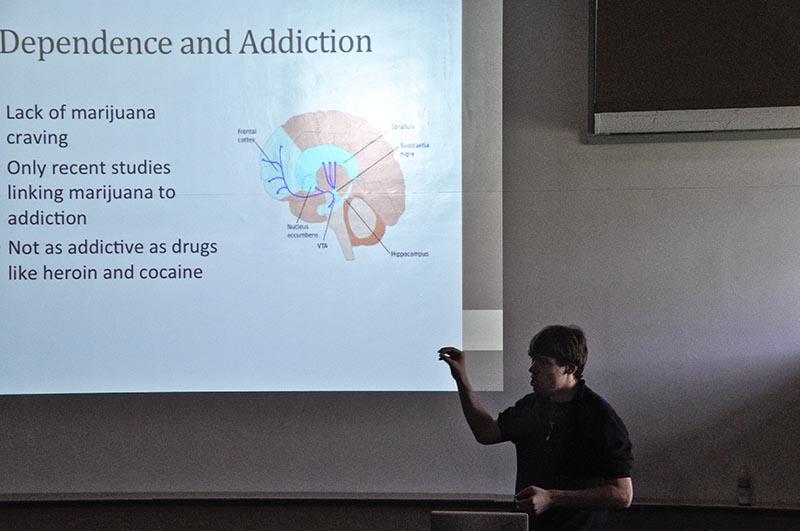Students Strive to Make Neuroscience Accessible
College junior Will Lynch discusses the effects of marijuana on the brain during the Drugs and Addiction talk this Wednesday. The Neuroscience student-powered lecture series consisted of five student-led TED-style talks and a question and answer session.
April 17, 2015
Nu Rho Psi and the Neuroscience Majors Committee hosted the first annual Neuroscience student-powered lecture series this week, a series of 20-minute TED-style talks sponsored by the committee. Organizers planned the event using suggestions from students in an effort to appeal to neuroscience majors and non-majors alike.
“A big part of the way we advertised and put the lectures together was targeting non-neuroscience majors,” explained College junior and Vice President of Nu Rho Psi Jason Freedman.
The event covered topics ranging from studying to addiction to sex and love. The series closed with a student Q&A led by double-degree fifth-year Geoff King and College senior Weelic Chong.
College senior Carey Lyons, secretary of Nu Rho Psi, gave a talk on Monday about sleep and dreams. She discussed the five stages of sleep, each with a characteristic type of brain activity, and explained that most dreams occur during rapid eye movement, or REM, sleep. During REM sleep, brain activity closely resembles waking patterns, but the body is paralyzed due to the repression of certain chemicals in the brain. Lyons then delved into the current theories about why people dream. While current research on this topic is not conclusive, many neuroscientists believe that dreams are a way that new information is consolidated into long-term memory in the hippocampus.
All of the lecture topics, including Lyons’ talk, were based on suggestions that Nu Rho Psi officers gathered while tabling in Mudd library and asking students to write down questions they had about the brain. Organizers then invited Neuroscience and Psychology students to sign up to give lectures about these questions. In order to ensure the accuracy and clarity of these lectures, Nu Rho Psi paired these students with a Neuroscience faculty member, who gave them guidance in preparing their talk.
The presentations, modeled on TED talks, were short in length and focused on explaining scientific concepts in terms that any student could understand, regardless of their background.
“[We hope students are] walking away with information that anyone would find interesting and relevant,” Freedman said.
Nu Rho Psi President and College senior Michelle Johnson described the lecture series as an opportunity to bring a larger neuroscience presence to campus.
“We wanted to give the campus a chance for the campus to see Neuroscience students in a different light. … We’re passionate, we want to share this information with other students,” Johnson said.
Similarly, organizers hope the talks will increase Nu Rho Psi’s visibility, which at the beginning of the year was not well known even among Neuroscience majors, according to Freedman.
“One goal when we set out at the beginning of the year was to exist on campus,” Freedman said. “We didn’t feel like there was a presence; even Neuroscience majors don’t know what Nu Rho Psi is. And we wanted to become a little bit more visible, and show the campus what sort of goals we have.”
Looking forward, Nu Rho Psi hopes to establish an annual event called Brain Awareness Month, according to Johnson.
Freedman said he hopes the month could be a collaboration between multiple student organizations.
“I’m hoping that we can reach out earlier to the student body and other student organizations like the Mental Health Alliance or Student Athlete organizations to see if we can partner with them and bring in specific information that is relevant to them,” Freedman said. “We hope that it expands to other departments and topics, increasing general appreciation for science. It’s something that’s really cool and a lot of people are really passionate about. … It’s about curiosity towards the universe that we all share.”





















